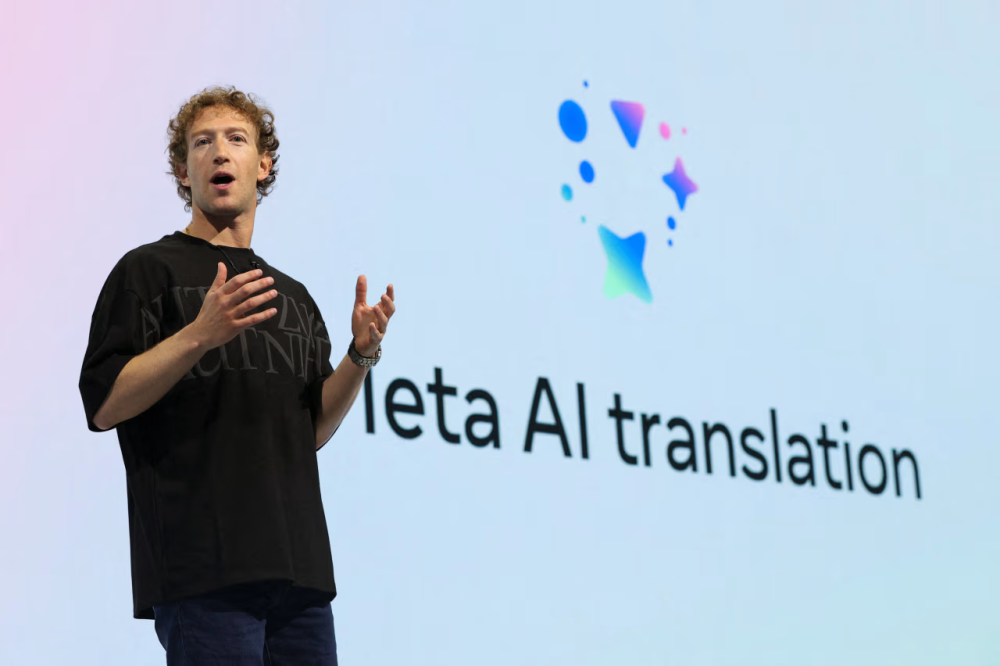Meta CEO Mark Zuckerberg presents Meta AI Translation at an event in Menlo Park, Calif., Sept. 25, 2024.
We can’t all be Mark Zuckerberg, dropping out of Harvard and creating a trillion-dollar company. But what if there were a million Zuckerbergs, or 100 million, all capable of doing amazing things? These “high-agency” people are being unleashed, Gian Segato, of the artificial-intelligence company Replit, said in an interview last week. He helped design AI tools to let you “turn your ideas into apps” using natural language instead of having to write code. Replit is taking off like a roadrunner, from $10 million in annual recurring revenue six months ago to $100 million today. Cursor AI and other competitors are experiencing similar growth.
Mr. Segato defines high-agency people as “those with a curiosity” and a personality trait one might call defiance, who “challenge the status quo and believe the world around them is changeable”—and then change it. They “struggle to be contained.” High-agency folks have always been around but either had to become specialists or hire specialists to get things done.
Tools now exist that can “make their vision happen,” Mr. Segato says. “AI isn’t democratizing the information part that is done by the internet. It’s democratizing actually making things.” High-agency people “have vision and drive—and now the tools.” And they’re cheap. “Intelligence just went from ‘I need to pay an engineer $200,000 a year’ to paying 20 bucks a month.”
These innovators aren’t always who you might expect. “Barbershops are building booking systems” by describing what they want to Replit. A Massachusetts restaurant used Replit to build an inventory-management system without hiring coders. I asked Mr. Segato what he could do with the model while we ate lunch. “The original Facebook. Yeah, I can build it on my phone right now in 10 minutes.” This is a big change.
Two Cornell students built “an app to help college students prepare for finals using spaced repetition and AI-generated flashcards,” Mr. Segato told me. They have more than four million users and millions in annual revenues. “Two kids, no venture money raised, no investors.”
Meanwhile 18-year-old Zachary Yadegari, who just graduated from Roslyn High School on New York’s Long Island, built the Cal AI app: Point your phone at your Chicken Alfredo and it tells you how many calories it contains, with about 90% accuracy. It’s been downloaded some six million times. Calorie tracking doesn’t kill jobs, it’s just additive to society. And here’s where it gets interesting: Zachary was rejected for admission by every Ivy League school and Stanford.
This is the bigger change. Mr. Segato notes that in the past, you had “to get a degree, get your stamp. But today, you no longer need to be specialized, because you can achieve the same thing using these tools. You no longer have to hire specialized people, because you can do that yourself and work at a higher level of abstraction.” He believes it’s the end of credentialism.
AI can do so much more than merely summarize emails. And these examples are just the tip of the high-agency iceberg. “It’s no longer as important to know how to do something. It’s knowing that it needs to be done and then just doing it. Plus, the opportunity cost is lower, and the cost of failure went down.” Let a million high-agency people bloom.
AI will take some getting used to. Mr. Segato notes that “software has historically been reactive.” Humans may not like proactive, so-called agentic AI systems, without human intervention. “We are faced with AI that can be unpredictable,” Mr. Segato points out. “Doctors and lawyers started using ChatGPT. We know also that they have to check the work. We need to point to someone that can take responsibility, and that someone needs to be specialized.” There is job security in being someone to blame, especially in healthcare, defense, drug development, aviation, even making AI tools.
But in industries involving experimentation—including marketing, design, finance, farming, architecture, therapy and even education—we can try and try again until we perfect something, without needing humans to blame if things go wrong. This is where high-agency people and AI tools will thrive.
With barriers to changing the world dropping, we are going to see more high-agency types come out of the woodwork. Will AI kill large chunks of white-collar jobs, as Dario Amodei, CEO of AI company Anthropic, recently predicted? Maybe, but Mr. Segato thinks AI won’t replace human ingenuity but instead will amplify it. Jobs show up elsewhere.
The use of AI by high-agency folks is “extremely fluid, but increasing supply is, interestingly, increasing the demand as well,” Mr. Segato says, “unlocking things that would not have been possible.” That’s similar to every technology cycle. “It’s impossible to deny the incredible opportunity that this is for so many people.” Jobs will be displaced, but many new types of jobs will flourish. Which side will you be on? Remember, credentials may no longer matter. Are you high agency?




